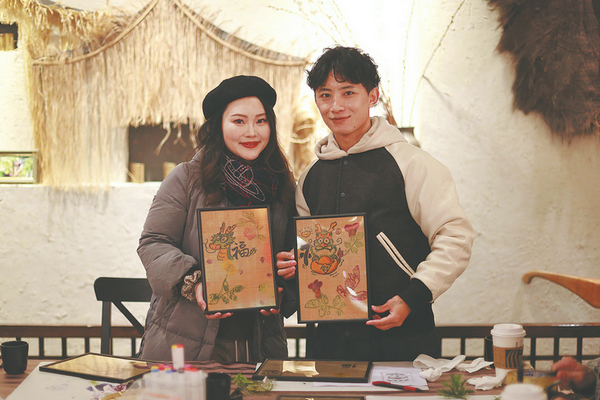Indian-Chinese couple brings ancient craft to the global stage


"My personal and professional journey took an unexpected yet fortuitous turn when I found love and got married in Rongchang in 2019," said Chen.
After Tang introduced Chen to Rongchang xiabu, the young man was soon captivated by the fabric and the exquisite craftsmanship meticulously preserved and passed down through generations.
Chen gave up his former job and embraced Rongchang as his new home. He serves as a cultural ambassador and seeks to promote Rongchang xiabu globally. He taught himself Chinese and became reasonably fluent within one year.
Their educational backgrounds, business acumen and cultural differences, propped up by Chen's eight years of hospitality experience, have given the couple a much broader perspective — honoring traditional practices while ensuring the product's relevance in the global marketplace.
In recent years, Rongchang xiabu has gradually become known to more cultures, thanks to the couple's joint efforts and sensitivity to international tastes. Xiabu products are sent to foreign diplomats from Germany, Poland and Switzerland as souvenirs.
They opened a xiabu-themed spa resort in Rongchang in 2021.To enhance clients' experience, they incorporated the anti-bacterial, breathable fabric during spa treatments.
A year later, the couple opened the Rongchang Buju Boutique Hotel, the first xiabu-themed hotel in Rongchang.
"The cultivation of ramie is sustainable, requiring less water and pesticides than many other crops," said Chen. "It represents an eco-friendly approach to textile production — an ancient wisdom of harmonizing with nature that is imperative in today's world."
The couple infused various xiabu elements into the guest rooms' linens, bedding and home decorations to promote an environmentally conscious lifestyle.
Last year, they opened a restaurant featuring Sichuan and Indian dishes in their hotel to enrich its cultural diversity.
"Witnessing the artisans' meticulous craftsmanship ignited a fervor within me to share this splendid tradition beyond the borders of Rongchang," said Chen.
According to the local commerce commission, the annual demand for xiabu in the international market reaches around three million bolts, among which 40 percent are sold to South Korea. In the last three years, 13 xiabu manufacturing companies in Rongchang, including Tang's family business, have exported goods worth more than 50 million yuan ($6.93 million).
In August last year, organized by the local commerce commission, the couple brought Rongchang xiabu to a textile exhibition in South Korea. In February, they exchanged wares with peers at a textile fair in Vietnam.
Chen said they will continue participating in international trade shows and cultural festivals to exhibit Rongchang xiabu's unique qualities and demonstrate its cultural significance.
He said India has excellent costumes and clothing design, but it's a pity that a culturally specific product like Rongchang xiabu is not very popular. Next, he is seeking international collaborations in his home market.
Chen also plans to launch educational programs to train new artisans and collaborate with fashion institutes. Additionally, he aims to partner with sustainable brands to integrate xiabu into modern wardrobes and work with educational institutions to provide workshops and lectures on xiabu.
Contact the writers at dengrui@chinadaily.com.cn




































